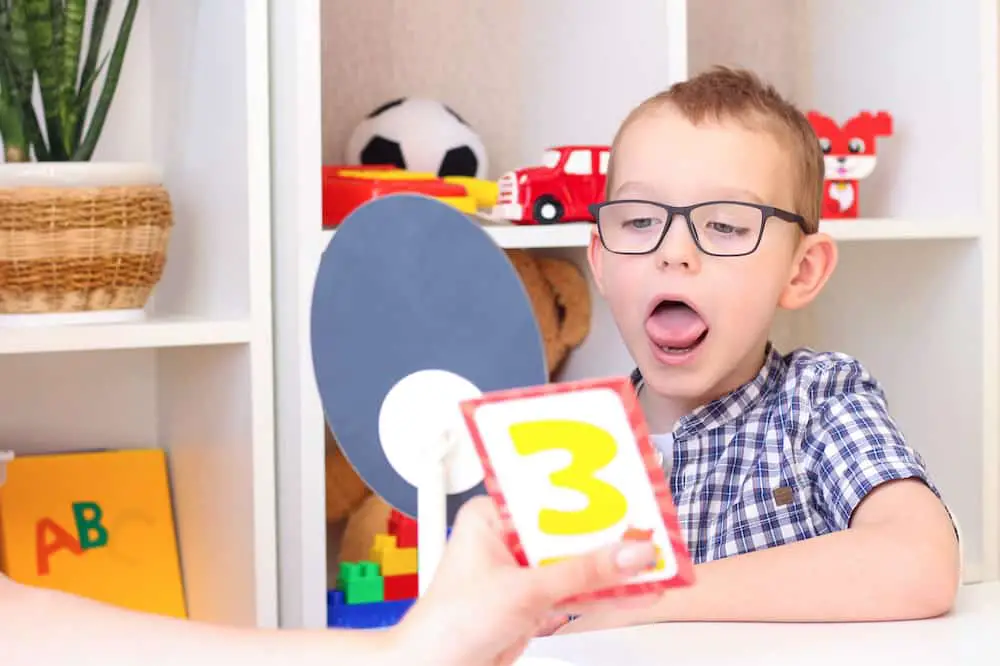Why does my child need speech therapy? Many parents ask this question.
It might help to know that professionals have development norms guide to check if a child’s progress is still within target.
If they notice that your child is behind in some areas, they will suggest working with a speech therapist.
What Is Speech Therapy?
Speech therapy is the evaluation and treatment of speech disorders and communication problems.
Speech-language pathologists, also known as speech therapists, typically perform sessions using strategies to improve communication.
A speech therapist chooses the kind of technique that is appropriate to your child’s speech disorder.
What Are Speech Disorders?
It is incredible how fast children grow, from helpless individuals to running toddlers in a heartbeat.
The same can be said for speech.
However, when a child encounters problems creating speech sounds to communicate effectively, he may have a speech disorder.
Here are some of the most common types of speech disorders:
1. Articulation Disorder
An articulation disorder is the failure to make specific word sounds appropriate.
A child experiencing this may add, distort, drop, or swap word sounds.
2. Fluency Disorder
Fluency disorders usually disturb the flow, rhythm, and speed of speech.
Cluttering and stuttering are typical fluency disorders.
If your child has stuttering issues, he may have blocked or interrupted speech, difficulty getting out a sound, or may repeat parts of a word.
On the other hand, a child with cluttering issues usually merges words or may speak very fast.
3. Resonance or Voice Disorders
Resonance or voice disorders happen when the vibrations in charge of voice quality change because of blockage or obstruction.
Resonance problems also happen when the velopharyngeal valve does not close correctly.
Generally, resonance or voice disorders are related to cleft palate, swollen tonsils, or other neurological diseases.
What Are the Signs of a Speech Delay?
No one knows their children better than parents. Some even understand their kids even if they don’t say anything.
Parents will also know if there is something wrong with their children even before a professional confirms it.
Although children go through similar speech and language development stages, they don’t go through the same phase at the same time.
Here are a few guidelines for you to check:
12 Months
At this age, your child should be able to use gestures to communicate or express themselves, such as waving goodbye or pointing.
18 Months
Children at 18 months should be able to use vocalization more to communicate with others rather than simply gesturing.
They should know how to imitate sounds and understand verbal requests at this stage.
24 Months
By two years old, most children can create words and phrases instantly, copy speech and actions, and follow simple instructions.
In addition to repeating different words and sounds, they can also communicate their needs and wants through oral language.
Most of the time, parents and caregivers can understand at least 50 percent of what these terrible twos are saying.
Generally, two-year-old kids can utter two- to three-word sentences from their more or less 50-word vocabulary.

What Causes Speech Delays?
Speech delays in kids may be due to different reasons. Sometimes, it may even involve multiple factors.
Here are some of the most common ones:
1. Problems with the Mouth
Children with problems with their mouth, palate, or tongue may cause speech delay issues.
One example is the condition called tongue-tie, where the tongue is attached to the mouth’s floor.
This problem makes it hard for the child to make specific sounds, specifically D, L, R, S, T, Z, and th.
2. Autism Spectrum Disorder
Children in the autism spectrum usually have speech and language problems.
You may also notice other signs, such as:
- Impaired social interaction
- Impaired non-verbal and verbal communication
- Repeating phrases
- Repetitive behaviors
- Speech and language regression
3. Hearing Loss
Sometimes, speech and language delays are the only noticeable sign of hearing loss, making it hard to diagnose straight away.
If you notice your child not responding when you name an object unless you use gestures, he may have problems with his hearing.
It is hard to form words if you only hear distorted speech or cannot hear anything at all.
4. Intellectual Disabilities
Intellectual disability or cognitive issues are another reason why children suffer from speech delay disorder.
5. Lack of Stimulation
The child’s environment has a significant role in his speech and language development.
It is hard for the child to learn how to speak if no one is talking to him.
Specific scenarios like abuse, lack of verbal stimulation, and neglect can hinder a child’s development.
6. Neurological Problems
Some neurological disorders affect muscles essential for speech, including cerebral palsy, muscular dystrophy, and traumatic brain injury.
7. Speech and Language Disorders
Speech and language delays are similar yet different types of communication disorders.
Children with speech delay problems have difficulty speaking many words but can understand and communicate non-verbally.
On the other hand, children who can speak a few words but are having a hard time articulating them may be suffering from language delay.
Some of these disorders may concern brain function, indicating a learning disability.
Premature birth is another cause of an overall developmental delay.
How Can Speech Therapy Help?
Your child’s ability to express himself is essential to his future success.
Speech therapy helps improve your child’s skills in communicating more effectively.
It also enhances his ability to comprehend and express his ideas, feelings, and thoughts.
The child will enhance his ability to solve problems independently as he expresses more intelligible speech.
These improvements will increase his independence as he acquires greater self-esteem.
You can be sure of a better quality of life as your child develops practical social skills from his speech therapy sessions.
Why Does My Child Need Speech Therapy?
There’s a wide range of developmental milestones, and each child develops according to his unique timetable.
If this statement is true, then why does my child need speech therapy?
You will hear this question from parents who do not see anything wrong with their children.
As you learn what speech and language development are, you will be better at observing your kids for any signs that might indicate a problem.

